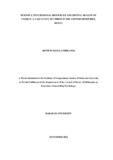BURNOUT, PSYCHOSOCIAL RESOURCES AND MENTAL HEALTH OF CLERGY: A CASE STUDY OF CHRIST IS THE ANSWER MINISTRIES, KENYA
Abstract
Clergy are important community resources offering support to persons in need and are
often the first to be called upon during emotional struggles. As such, they experience
increased risk exposure to burnout. The study aimed to investigate the influence of
burnout on mental health of clergy of Christ Is The Answer Ministries in Kenya
(CITAM). The study was guided by five objectives: to establish the influence of
emotional exhaustion on mental health of the clergy; to examine the influence of
depersonalisation on mental health of the clergy; to determine the influence of low sense
of accomplishment on mental health of the clergy; to find out the intervening role of
psychosocial resources in mitigating burnout of the clergy, and to determine the
influence of respondents‟ demographic traits on burnout and mental health of the clergy.
A mixed-methods research design was used by combining quantitative and qualitative
data. The target population was 91 clergy members of CITAM. The accessible
population was 86 clergy members based in 25 assemblies in Kenya. Census technique
was applied by administering the study to the entire accessible population. The study
used in-depth interview guides alongside structured questionnaire. The questionnaire
comprised Scale of Emotional Exhaustion in Ministry (SEEM) and a modified version of
Maslach Burnout Inventory (MBI). Mental health was measured using a 5-point Likert
scale adapted from the Short Warwick–Edinburgh Mental health Scale (SWEMWBS).
The questionnaire was administered face-to-face. Instrument reliability was tested using
Cronbach‟s alpha. All the items returned an alpha coefficient greater than 0.7. The
individual interviews were conducted with 12 senior level clergy members of CITAM
based at its Head Office. All instruments used were ascertained for criterion, face and
content validity. The overall response rate was 79 percent. Questionnaire data was
analysed using nonparametric inferential techniques such as Spearman‟s Rank
Correlation Technique and Chi-square Test of Association. Quantitative data analysis
was undertaken using SPSS version 25. Hypothesis testing was undertaken and statistical
significance was accepted at p<.05. In-depth interviews were analysed using thematic
analysis techniques. The resultant outputs were presented in figures and tables for ease of
interpretation. Emotional exhaustion was the most prevalent burnout sub-type with a
composite mean index of 2.18. All the three burnout sub-types were weakly correlated to
poor mental health while the chi-square tests of association were not statistically
significant. Psychosocial resources were highly available for 54% of the respondents.
The overall mental health score on a 5-point scale was high (=4.38, =0.45), with 85%
of the respondents having good mental health. Gender and years of service had
statistically significant influence on both sense of accomplishment and mental health.
The significance of the effect of burnout on clergy mental health was eliminated by the
psychosocial resources. It was recommended that interventions that enhance the
frequency and depth of debriefing by professional counsellors should be enhanced. The
whole spectrum of predisposing and risk factors that are detrimental to clergy mental
health should be considered for future psychosocial resource programming.

